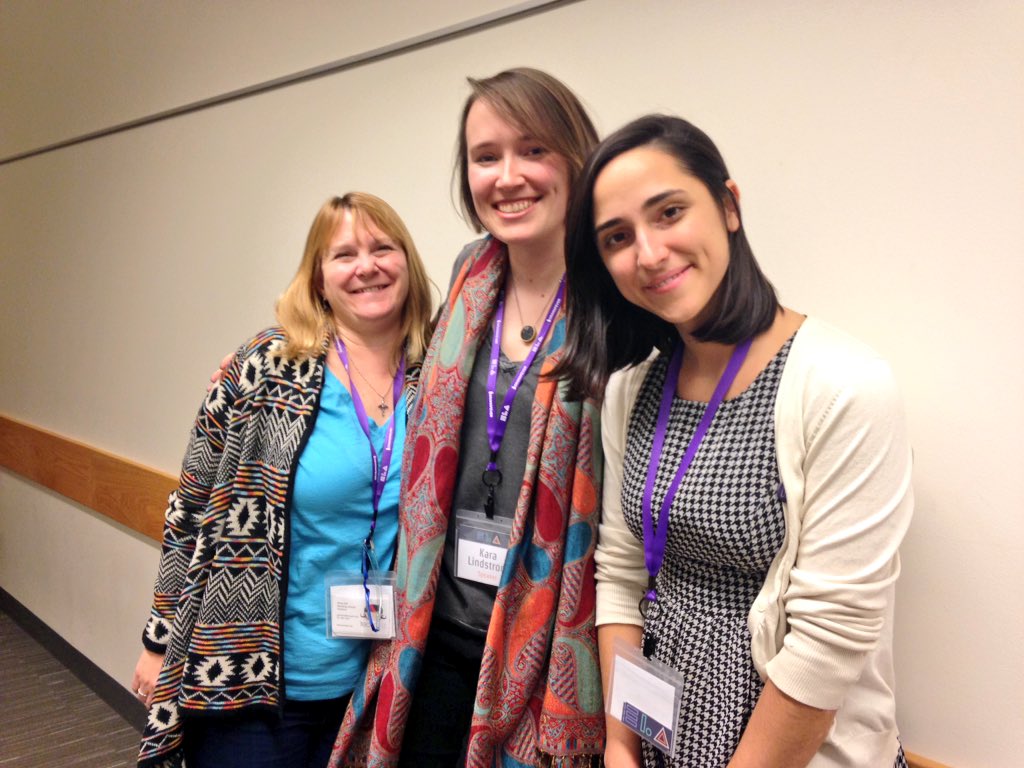Dawn McDougall‘s very first Code for Philly meetup wasn’t exactly easy.
McDougall was an undergrad at Drexel at the time, studying urbanism and working on a research project about the civic hacking community.
She remembers it this way: Everyone had their heads down, focused on the glare of their laptops. No one looked liked her — they were all men. She wondered if she was even in the right place.
But for the better part of a year, she kept going to the meetups, even after the research project ended, even though she didn’t feel like she had anything meaningful to contribute because she wasn’t a programmer and hadn’t found her footing in the community yet.
Now, McDougall’s the executive director of Code for Philly, the civic hacking group best known as a gathering of the city’s leading open data-obsessed developers.
She shared her story, of being a non-technical woman in tech, alongside Women in Tech Summit cofounder Gloria Bell and ExCITe Center program manager Kara Lindstrom at this weekend’s women in tech leadership-focused ELA Conf in a panel moderated by this reporter. None having coding backgrounds or much expertise, though they regularly lead and work and convene those who do.
The idea for the panel came from Bell, who said that women sometimes are unwilling to identify as a “woman in tech” if they don’t code, whereas men who work in business development, as program managers or in quality assurance will more than readily identify as a technologist.
(Bell’s not the only ones thinking about this: check out Emily Rasowsky’s Women in Tech campaign, which seeks to redefine the term, as covered by our sister site Technical.ly Baltimore.)
https://twitter.com/elaconf/status/668141630587863042
All three women spoke of falling into tech, of working to find their roles in the tech scene and what it took to feel like they were really part of the scene — that last one, they said, can be particularly tricky when you aren’t a programmer. It was interesting to hear this other side to their stories, that it took them a while to identify as technologists, since each of them are local leaders and fixtures in the tech scene.
Lindstrom found her way into the tech scene after getting a part-time job at Drexel, answering phones for the undergraduate engineering office. She had recently gotten her masters in architecture and design but wasn’t able to find a gig in the field. Lindstrom impressed her bosses (“The associate dean was like, ‘This chick, she does stuff,'” she said) and they created a role for her when Drexel won part of a federal grant for the Philly KEYSPOT digital access project.
As for Bell, she left her cushy job in the insurance industry to start her own consultancy for startups when she realized that the founders she kept meeting didn’t know how to run a business. It was a big leap. She also took on an events leadership role at the volunteer-run entrepreneur support network Philly Startup Leaders.
“Go big or go home, baby,” she said she thought at the time.
It was hard as an outsider, but the tech crowd “saw value in the fact that I was different,” she said.
The career switch was eye opening, as Bell learned “all of this stuff that [she] didn’t know [she] could do” (Bell was 45 when she started taking Girl Develop It classes) and met “all of these people that [she] never thought would accept [her].”
So why did McDougall keep coming back to Code for Philly, week after week for almost a year, when she didn’t feel like she had anything to contribute?
For one, she was curious. She was working to understand these people who wanted to spend their free time building apps — for free — to make the city a better place.
The people at Code for Philly had also become her friends (her professor took her off the research project when she realized McDougall had grown too close to the community), and that made it easy and natural to return every week.
But she also took that time to figure out where she fit, where she could be helpful, and she said she wasn’t hard on herself that it took that long. It was important, she said, to be forgiving with herself when it came to that learning curve.
McDougall has since taken it upon herself to be that person she wished had been at Code for Philly when she first showed up. The person who welcomes you to the group, gives you a lay of the land and helps you feel less isolated — especially women.
“I want other women to have what I didn’t,” she said.
She said she hopes that keeps people coming back to Code for Philly.







